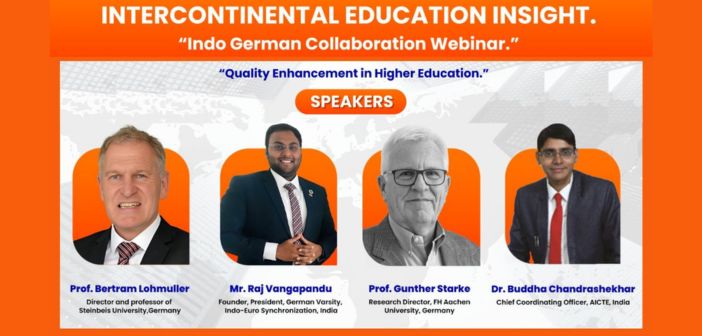The German Varsity and Indo Euro Synchronization (IES) organized the inaugural webinar of the Indo-German Collaboration Webinar Series on “Quality Enhancement in Higher Education” in partnership with National Skills Network (NSN) on September 7th, 2023. This webinar marked the beginning of a series of five webinars which aim to discuss action plans to improve the quality of education and international education and employment opportunities for Indian students.
Indo Euro Synchronization has established a platform to address the crucial matter of India’s Presidential patronage of 20 esteemed German universities. This initiative seeks to foster bilateral discussions by convening 20 distinguished speakers, each focusing on a unique topic that bridges the relationship between India and Germany.
The German-Indian higher education collaboration has created an ambitious plan of five webinars and actionable strategies for September and October. The primary objective is to enhance educational standards and create more international prospects for Indian students.
Quality is paramount in education, especially when preparing our youth for higher education and career prospects in Germany.
Indo German Collaboration Webinar Series: First Webinar Report
The eminent speakers for the webinar were Prof. Bertram Lohmuller, Director and Professor of Steinbeis University, Germany; Mr. Raj Vangapandu, Founder, President, German Varsity, Indo-Euro Synchronization, India; and Dr. Buddha Chandrashekhar, Chief Coordinating Officer, AICTE, India. The webinar was moderated by Dr. Madhuri Dubey, Founder – Director, National Skills Network (NSN).
The panel focused on the following points during the webinar:
- The need for quality enhancement in higher education
- Strategies for achieving quality education
- Design and planning driven by quality measures in education
During the webinar, a presentation was delivered by Prof. Bertram, during which he elaborated on the Quality Quadrangle – Project Competence Study framework. This framework was introduced to tackle quality-related concerns in education. Prof. Bertram provided insights into the framework’s application in defining and addressing quality issues.

Quality Enhancement in Higher Education
The speakers emphasized the importance of continuous improvement in the quality of higher education. They discussed several methods for achieving this, including curriculum development, faculty training, technology integration, research and innovation, student support services, accreditation, collaboration, diversity, and inclusion.
Prof. Bertram Lohmuller discussed Steinbeis’s unique educational approach, wherein students fully engage in hands-on training while pursuing their Master’s in engineering, electronics, or mechatronics, depending on their respective fields. Regardless of the specialization, the methodology remains consistent.
Prof. Bertram Lohmuller said, “In this model, Steinbeis strongly emphasizes evaluating students’ effectiveness in delivering tangible outcomes for their specific projects. This evaluation process involves initial discussions with both students and project owners. Subsequently, a roadmap is meticulously crafted to guide the students in aligning their project results with the academic and practical aspects of their Master’s program over the next two years.
This approach, rooted in the German perspective and Steinbeis’s principles, incorporates robust quality measures and scorecards. These metrics serve as valuable tools for assessing and enhancing the educational model. Furthermore, they can be leveraged to initiate discussions with our colleagues in India, fostering cross-cultural collaboration and knowledge exchange.”
Mr. Raj Vangapandu emphasized the significance of quality in higher education, “For almost a decade, we have collaborated with German universities at IES to introduce a comprehensive three-tier quality methodology into Indian higher education. This effort aims to ensure due diligence and certification of educational institutions with a high-quality standard. Our goal is to impact higher education’s quality enhancement substantially.”
Dr. Buddha Chandrashekhar has shared his perspective on the importance of quality in higher education, stating, “Delivering high-quality content and enhancing quality, particularly during the design and planning phases, will be pivotal. I want to propose some transformative considerations, including the need for greater collaboration, developing a universally accepted curriculum, ensuring content relevance nationally and internationally, fostering critical thinking, and maximizing the utilization of existing infrastructure. As we create content-driven curricula, it is crucial to prioritize quality enhancement and adhere to world-class standards while harnessing the power of technology, which plays a significant role in content development.”
The panel discussion was followed by a QnA where the speakers answered a few important questions from the audience shared in the Live chat.
The Indo German Collaboration Webinar highlighted the significance of quality enhancement in higher education. The ongoing efforts to improve education standards and create international opportunities for Indian students align to prepare the youth for successful careers in India and abroad. Collaboration between the two nations can bring about positive changes in the education sector.
If you wish to know more about the Indo German Collaboration Webinar, please write to executive@indoeurosync.com












